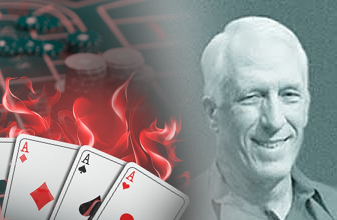Questions for Wong

A reader asks:
Would you counsel in favor or against “rat-holing” chips during casino play? Las Vegas casinos so closely monitor the quantities of chips that I usually attempt, on a $1000 buy-in, to squirrel away $100-$200 in chips during an hour of play, in order to exaggerate losses and minimize wins. In your opinion, does the risk outweigh the benefit, particularly with “the eye in the sky”?
I do not like to have a large pile of chips on the blackjack table in front of me. It attracts too much attention from other customers. If chips start to pile up in front of me, I stick some in my pocket, but I am not sneaky about it. Sometimes I will ask the dealer to exchange some of mine for chips of a higher denomination, and I explain that I want to put them in my pocket.
Ploppies often remove chips from the table and stash them in pockets or purses. Therefore, doing so will not mark you as a card counter. However, casino people are suspicious of customers who establish a “credit line”, take out markers to buy chips, and then exchange chips for cash. If such customers never pay off their markers, they are stealing from the casino. It happens. If you are playing to front money instead of “credit”, you should not be suspect. If anyone asks you why you are putting chips aside, you can make up a believable reason. For example, “My wife/husband gets the bonus every time I get a natural.” Or nonsense like, “I found a system that works. Every time I win three hands in a row, I put a bet in my pocket.”
A reader says:
After a very modest win, I was flabbergasted when the cashier picked up the phone and told the pit how much I cashed in. I was equally floored when the cashier at another casino picked up the phone, looked me straight in the eye, and announced to the pit “fourteen black.” I had played conservatively at both places, did not up my bets, and thought I blended well. Quite obviously, I was wrong.
Your experiences were not unusual. The cashiers were not using anti-counter tactics. In some casinos only chips of $500 and larger denominations are called to the pit; at small casinos the attention starts even with $25 chips. The cashier calls the pit to give casino executives a chance to react if something is wrong. It is protection against counterfeit chips, and it is protection against customers who use credit to buy chips and then attempt to convert them to cash instead of paying off their casino debts.
How Big to Bet?
You may find that jumping into the middle of a shoe with a big bet draws unwanted attention, even if you flat bet. If that is so, try to find the point at which attention starts. For example, the attention may start at $200 and become more intense with higher bets. The attention of non-counting bosses might be a plus of course, since it can result in comps. However, if you want to jump into a positive count and bet big, but with as little attention as possible, you might be better off starting with a bet that will not attract attention; for example, a bet under $200. You might find that jumping into a shoe with a bet sequence of $150-$300-$400 draws less heat than with $200-$200-$200. Even if the dealer calls out “checks play,” the pit boss may not come to the table if the checks belong to a person who is already playing at that table.
Rudimentary Shuffle Tracking
Here is something you can do to get a little extra edge. It is not too difficult. If you see a large clump of high cards — or a large clump of low cards — remember where the clump is in the discards and follow its progress through the shuffle. If the shuffle is incomplete, and if the high cards are cut to the top or low cards are cut to the bottom, you can bet big on the first round of the shoe. Conversely, if the low cards are cut to the top or the high cards are cut to the bottom, it is time to change tables.
Ceiling Mirrors
One more hint: Check out the ceiling. Are there mirrors? If yes, you might be able to count cards at a table 60 feet away. Do not be obvious about it of course; raise your eyes without tilting your head.
Excerpted with permission from the e-book version of Professional Blackjack by Stanford Wong, edited for this format.











Please log in or register to leave a comment